Table of Contents
- 1 Egg donation success rate – summary
- 2 Success rates with donor eggs in IVF – what do statistics mean?
- 3 Does the donor egg IVF success rate depend on a woman’s age?
- 4 Donor egg IVF success rates – fresh eggs vs frozen eggs
- 5 How many donor egg cycles before success?
- 6 How successful is egg donor IVF?
- 7 What factors influence the success rates of egg donor IVF?
- 8 7 things you need to know about egg donation success rates
- 9 IVF clinics’ methods of presenting success rates for IVF with donor eggs – the use of marketing techniques
- 10 IVF cumulative pregnancy rates or cumulative live birth rates
- 11 What exactly impacts the egg donation success rates?
- 12 Success rates of IVF with donor eggs – the USA, the UK, and Spain
- 13 Types of donor egg programs
- 14 If you need help choosing an IVF clinic abroad, spare 3 minutes of your time. You will save at least a few hours.
- 15 Does age affect success rates with donor eggs?
- 16 How many donor egg cycles does it usually take to get pregnant?
- 17 Final thoughts: navigating IVF success rates for donor eggs
- 18 Donor eggs IVF success rates – FAQ
- 19 EggDonationFriends recommendations
- 20 Donor egg success rate – take-home message
Egg donation success rate – summary
- Actual Success Rates: IVF with donor eggs has an average success rate of 65.9% for fresh cycles and 52.3% for frozen cycles, with live birth rates approximately 10% lower.
- Age Factor: The recipient’s age has minimal impact on success rates when using donor eggs, as the donor’s age is the primary factor.
- Fresh vs. Frozen Eggs: Fresh donor eggs typically result in higher success rates compared to frozen ones.
- Cumulative Success Rates: Undergoing multiple IVF cycles can increase the cumulative success rate, with some clinics reporting up to 90% success after three cycles.
- Pregnancy Funnel: The journey from embryo transfer to live birth involves several stages, each with its own success rate, leading to an overall live birth rate of about 45-55%.
- Clinic Reporting Practices: Clinics may present success rates differently, such as per embryo transfer or per started cycle, which can affect the perceived effectiveness of their programs.
- Factors Influencing Success: Donor selection, embryo quality, and the recipient’s uterine environment are critical factors affecting the success of IVF with donor eggs.
If you are looking for a clinic to have IVF treatment using donor eggs and you are wondering what IVF donor egg success rates are, read our article. While analysing the Internet forums, it can be easily seen that most patients searching for a clinic ask two important questions:
- What is the IVF donor egg success rate?
- What is the cost of the fertility treatment using donor eggs?
Let’s focus on the first one – the success rates of donor egg IVF. If you ask the first question on an Internet forum, you will get one of two answers, either, “very good – success!” and “not good – failure!” Unfortunately, such information will not make choosing the fertility clinic any easier. Internet forums can be a good source of content-related knowledge, but unfortunately understanding of the underlying meanings of egg donation success rates, the ability to read the statistics published by the clinics, and, indeed knowing what to pay attention to – all require something more than a simple “success” or “failure.”
So is there anything related to the chances of getting pregnant with donor eggs that clinics don’t want to tell you? Yeah… there are many things clinics won’t tell you – the fertility sector is very competitive and clinics are sensitive to sharing information they feel might benefit another clinic! They know what the patient is looking for (we know that) – it is the IVF success rate and this rate can be promoted in different ways which can, in turn, increase its value.
Success rates with donor eggs in IVF – what do statistics mean?
Donor egg success rates indicate the percentage of fertility treatment effectiveness in IVF with donor eggs. In other words, they show pregnancy rates using donor eggs – what number of patients after fertility treatment (1 IVF cycle) become pregnant or (depending on the presentation method) give birth to a child. Such data is usually presented as the same percentage regardless of the age of the woman. For example, if the efficacy value is 51%, it means that 51 patients in 100 who are treated will get pregnant (or give birth), depending on how the statistic has been calculated.
Does the donor egg IVF success rate depend on a woman’s age?
In the case of fertility treatment with donor eggs, the age of the woman is not very important. In short, egg donation success rates will be more or less similar for each patient’s age group.
Below we present examples of egg donation success rates, including women’s age, developed on the basis of the SART Predictor – IVF calculator. SART Predictor uses a very large database of cycles: almost 500,000 IVF cycles in the US since 2006. After entering the appropriate values into the IVF Calculator and changing the age of a woman to over 45 years, the statistics, on average, decrease by one percent for every year of life.
The following results apply to live births and not pregnancy rates per transfer, so this is the most important information on treatment statistics a patient can receive.
IVF with donor egg’ success rates were developed for individual age groups of women, with the following assumptions:
- The cause of infertility: Diminished Ovarian Reserve
- Woman’s height, weight: 1.65 m, 69 kg
- Prior pregnancies: No.

Donor egg IVF success rates – fresh eggs vs frozen eggs
Patients considering various fertility treatment methods are wondering whether it is better to use a programme with fresh or frozen eggs. Of course, eventually, it is always theirs and their fertility specialist’s decision but still, it is good to know one’s own chances as well as risks and challenges. The pros and cons have been explained above, but the latest available statistics also merit attention. Below we present the success rates of such programmes, including:
- Fresh donor eggs / pregnancy
- Fresh donor eggs / live birth
- Frozen donor eggs / pregnancy
- Frozen donor eggs / live birth
The data was developed based on the CDC (Centers for Disease Control and Prevention) 2015 report. Data is not presented per patient’s age because according to the CDC, the differences between the success rates in a particular patient’s age range are minimal.
“All ages are reported together because previous data show that patient age does not materially affect success with donor eggs.”
CDC – 2021 Assisted Reproductive Technology, Fertility Clinic Success Rates Report
As shown in the chart below (for year 2015 CDC USA), the success rate for IVF with donor eggs fresh cycle – is on average 65.9%; while the success rate for live birth is approximately 10% less (55.6%). Similarly, the success rate in the IVF program with donor eggs – frozen cycle – is 52.3% with clinical pregnancy and 42.3% in case of a live birth.
According to the latest report from CDC – 2021 Assisted Reproductive Technology – Fertility Clinic and National Summary Report – the IVF success rates (live births) using donor eggs are:
- egg donation – fresh embryos and fresh eggs – 53.9%
- egg donation – fresh embryos and frozen eggs – 45.8%
Regardless of the report’s date, the statistics show differences between fresh and frozen eggs used for egg donation IVF, with an average level of 8% in 2021 and 13% in 2018 (see the chart below).
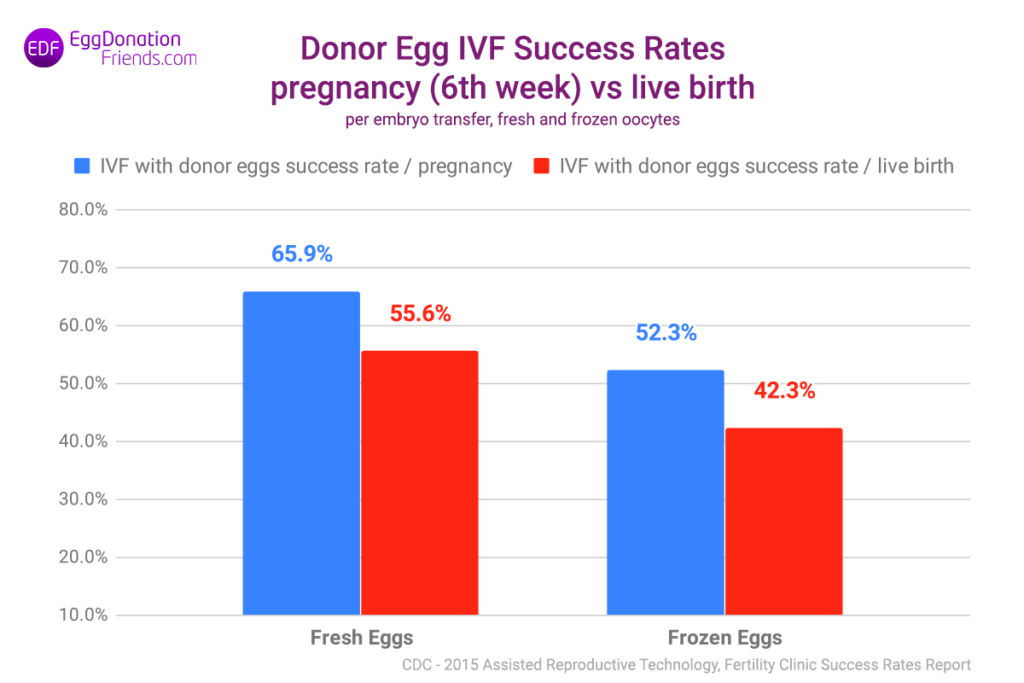
How many donor egg cycles before success?
Many patients ask how many egg donation cycles they need to have a successful treatment. The answer is difficult. Many clinics report “cumulative” egg donation success rates at range of 90% for 3 cycles. However it all depends on individual situation of the patient – diagnosis, infertility background and treatment history. The best way to get an answer to this question is to consult IVF specialist at the clinic.
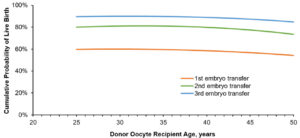
How successful is egg donor IVF?
If you are reading this article and you are planning your treatment journey, you should be aware that in case of IVF with donor eggs, you have an average (watch the video and see below):
- 80% chance
that after the egg fertilisation you will receive properly developing embryos - another 75-85% chance
that the embryos transferred to your uterus will implant correctly - another 70-80% chance
that you will be diagnosed with a biochemical pregnancy (1 week after the embryo transfer) - another 55-65% chance
that you will be diagnosed with a clinical pregnancy – a 12-week ultrasound scan - and finally – about a 45-55% chance
that you will give an actual birth to a child.
This means that, on average, 1 in 2 women having IVF treatment with donor eggs will end up having their dream child. This can be linked to many factors. However, bear in mind that when you have a second round of fertility treatment, your chances grow. Are you curious why this is so? Let’s start from the beginning.
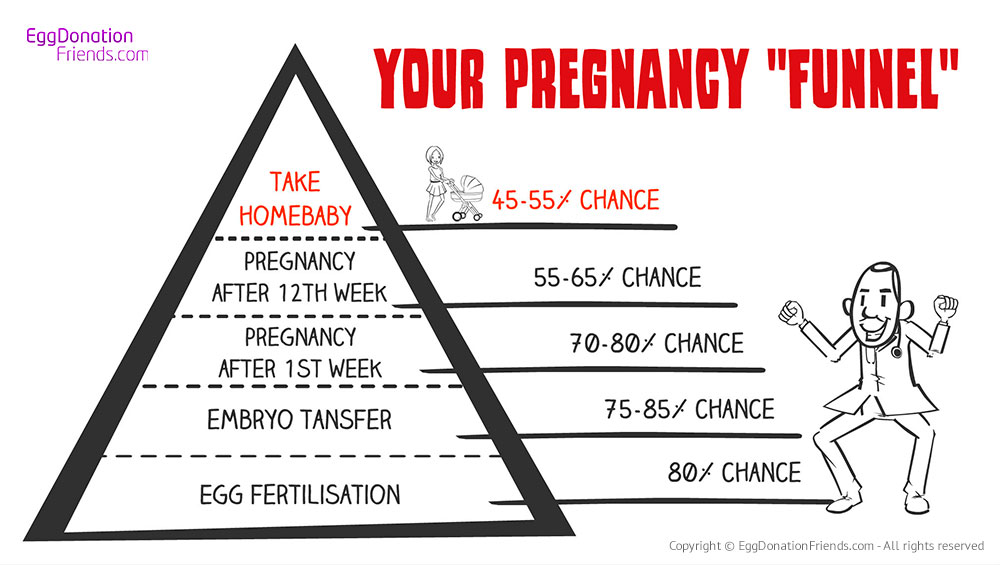
What factors influence the success rates of egg donor IVF?
Several factors influence the success rates of egg donor IVF, with the quality of the donor’s eggs being one of the most important. Since the eggs used in this process come from younger, healthy women, they generally have a higher potential for successful fertilization, embryo development, and implantation. While the use of donor eggs bypasses issues related to age and egg quality in the recipient, factors such as uterine health, hormone levels, and the ability to support a pregnancy are crucial.
Another important factor is the expertise of the fertility clinic and its approach to the IVF process. The clinic’s success rate with egg donor IVF, experience with embryo culture techniques, and the use of advanced technologies can also impact the outcome.
You may be interested in reading: What are the reasons for Donor Egg IVF failure?
7 things you need to know about egg donation success rates
- Statistically, in fertility treatments using donor eggs, success rates are not dependent on the recipient’s age. This means that if you are able to become pregnant and carry to term, it does not matter whether you’re already in menopause or not. Your chances for bearing a child will be, on average, the same as in younger women. That is why looking for a fertility centre which shows the statistics by patient’s age can be misleading.
- On average about 20-30% of miscarriages occur before the 12th week after IVF treatment.
- There is no standardised method for presenting egg donor statistics. IVF centres apply various methodologies in calculating their success rates and do not always give information on how the statistics have been derived.
- Most often, IVF clinics present data related to the success rate based on a percentage of clinical pregnancies (at 6 weeks) per embryo transfer.
This data does not include miscarriages occurring between 6th and 12th week of pregnancy. - It is rare for fertility clinics to present data related to the successful outcome of IVF with donor eggs based on the percentage of live births of healthy babies.
This type of statistics will always be lower. Please note, some IVF clinics are not able to monitor a single patient over a longer period of time, so they simply do not have such data. - Healthy baby birth rates from egg donor programs are (on average) 10-20% lower than the percentage of clinical pregnancies (at 6 weeks) achieved per embryo transfer. However, only “live births” are real statistics showing your chances of having a child.
- Clinics usually do not reveal details and statistics regarding egg donors. Age is not a factor here. More relevant is, for example, if the egg donor has previously had a healthy baby. There are no statistics shown where the IVF success rates after egg donation treatment is correlated to the donor specific situation and background.
IVF clinics’ methods of presenting success rates for IVF with donor eggs – the use of marketing techniques
- Pregnancy per patient’s cycle. This type of statistic is very rarely presented by fertility centres. Statistically, the results presented this way would be the lowest. This stems from the fact that an egg recipient’s cycle may not be completed due to, for example, poor embryos or no fertilisation. Cancelled cycles where no embryo transfer occurred may be around 10% to 20%.
- Biochemical pregnancy per embryo transfer. Biochemical pregnancy is diagnosed based on laboratory examination, usually 1 week after the embryo transfer. This type of statistic is often used by in vitro clinics because it shows very good results. It does not include cases with failed embryo transfers and only includes successful cycles. Also, pregnancy is diagnosed 1 week after the embryo transfer so later miscarriages are not taken into account.
- Clinical pregnancy per embryo transfer at 6 or 12 weeks of pregnancy. Clinical pregnancy is diagnosed on the basis of laboratory blood tests and ultrasound at 6 or 12 weeks. The most often presented results refer to pregnancies diagnosed at 6 weeks. The ultrasound shows a visible gestational sac in the uterus. Here, the statistics are better than those for 12 weeks. Again, they do not include any miscarriages occurring at 6-12 weeks.
- Take-home baby rate. Giving birth to a healthy child after IVF treatment with donor eggs is a rarely presented outcome. The reason is simple: these are the lowest of all the statistics. Fertility clinics often do not know if a pregnancy ended in a live birth or not – they are just not able to monitor a patient over such a long period of time.
IVF cumulative pregnancy rates or cumulative live birth rates
Nowadays, more and more clinics publish cumulative success rates for fertility treatments (IUI, ICSI, IVF) performed at their facilities. We have prepared a separate article on this exact topic. If you are a patient at the beginning of your treatment journey and you are searching for the right IVF clinic performing egg donations, then “donor eggs IVF success rate” is one of the factors to be taken into consideration in your research.
“Cumulative success rate” indicates the percentage of patients who got pregnant after a few rounds of IVF performed at the clinic (usually 3 attempts). It’s important to know how to read data provided by the clinic regarding the successful treatment outcomes.
Why do some IVF centres decide to provide the information about egg donor IVF success rates this way? What are the methods of calculation? Is there a marketing catch or is there medical justification for such publications?
Read more here: Cumulative pregnancy rates or cumulative live birth rates – what do they mean?
What exactly impacts the egg donation success rates?
- The quality of the donor’s eggs.
The quality of donor eggs (oocytes) greatly influences IVF success rates. Donors are usually aged 18-35, with the qualifying age differing in various countries. In some countries, the donor may qualify if she is 19-20 but below 30. The best eggs – oocytes the clinics receive are those coming from donors who have had at least one baby before. It is thought that such eggs have greater potential. However, donors like this are scarce. Other qualifying factors are also important: age, AMH level, infection tests or genetic tests, e.g. karyotype analysis. Acquiring a qualified egg donor is extremely expensive, often constituting half of the costs of the whole programme. That is why skipping some qualification factors can be tempting for some in vitro clinics if they want to save money. All of this can result in lower egg quality. - Experience and quality of IVF laboratory.
The experience of the team of embryologists and the standard of the laboratory are crucial factors which influence the successful outcome. This is true not only in cases of egg donation but also in IVF programs with own eggs. - IVF procedures in the IVF laboratory.
There are many IVF techniques which can be used in different scenarios based on the patient’s medical history and medical indications. Available fertility treatments include ICSI, AH (assisted hatching), blastocyst culture & embryo transfer on day 5, PGS (preimplantation genetics screening) and so on. There are also techniques which are recommended for male factor infertility such as MACS, IMSI, PICSI. Remember that male factor infertility may be the case in 40-50% of IVF programs on average – unless you use donor sperm. - Your and your partner’s medical condition.
Bear in mind that in case of egg donation, donor eggs take replace of patient’s eggs. The latter may be scarce or of insufficient quality – like in primary ovarian insufficiency (POI) when ovaries might not mature or release eggs correctly. However, there is an additional factor that can influence the egg donor IVF success rates – it is your partner’s genetic material and the quality of his sperm. Make sure your partner has had the necessary medical screening: sperm analysis, sperm DNA fragmentation test and, most of all, genetic tests, e.g. karyotype analysis. It can happen that, in addition to donor eggs, you may have to consider using donor sperm as well. Statistically, according to CDC (National Center for Chronic Disease Prevention and Health Promotion) – about 36% of IVF programmes are carried out because of the “male factor” – that is because of issues on the partner’s side. However, the data is based on all IVF cycles performed – autologous and donor egg cycles. According to IVF centres we work with and our own data on donor eggs IVF cycles, about 40% to 55% of patients are struggling with “male factor” related issues. - …and most importantly – your attitude.
We keep meeting patients who say they are looking for a clinic which they will visit only once, for a maximum for 2-3 days, to have the embryos transferred. They claim they do not have time to travel that much and some of them mention the financial limitations. A positive, realistic attitude to treatment puts you on the road to success.
Fast, cheap treatment does not necessarily lead to success – in fact, these two terms are mutually exclusive. If your clinic claims otherwise, think if this is really what you expect and carefully consider your decision. Don’t let yourself be guided by strong emotions or false expectations. We know that you want to become a mum as fast as possible. But remember: some elements of the process, like getting to know the patient, appointment with your chosen doctor and direct patient-doctor contact cannot be replaced by an e-mail or a Skype call. The correct medical process should involve proper preparation and thorough consultation with the doctor who will check if there are no contraindications for pregnancy, regardless of the fertilisation method you decide on. The doctor needs to look at both you and your partner’s medical histories to check that nothing has been overlooked. While embryo transfer is not a complicated procedure, you should stay somewhere near the IVF clinic, at least for the evening before and for the day of the transfer. If possible, fly the day after the transfer. Try to avoid any stressful situations and activities during your fertility treatment.
Success rates of IVF with donor eggs – the USA, the UK, and Spain
Below you will find the statistics published by SART (the USA) – 2018, SEF (Spain) – 2018 and, HFEA (the UK) – 2018. The data includes over 90% of in vitro clinics from each country. Unfortunately, some data is not available in certain countries.
| Spain | USA | UK | |
|---|---|---|---|
| Fresh donor eggs -pregnancies | 55.1% | no data | no data |
| Fresh donor eggs - live births | 41.4% | 57.10% | 31%* |
| Frozen donor eggs - pregnancies | 50.6% | no data | no data |
| Frozen donor eggs - live births | 37.4% | 44.20% | no data* |
*Important note: There is no mention of frozen donor egg IVF success rates in the UK (HFEA) – we assume the data – statistics above for the UK may refer to IVF cycles with fresh donor eggs and frozen donor eggs – an average for both groups.
It is worth mentioning that in the case of Spanish statistics, the data may not be complete. This is because of the fact that in Spain, just like in many other European countries, there are many egg donation programs performed for foreign patients. Unfortunately, in most cases, monitoring the results of such programs till delivery “live birth” can be difficult and sometimes impossible.
The statistics offered by the best IVF clinics in Europe are as good as those in the USA. Many fertility centres can even boast higher success rates than the average rate in the USA.
Types of donor egg programs
- Program with fresh donor eggs – fresh eggs transfer. The whole programme is carried out in a synchronised cycle of the donor and the recipient.
The success rate of IVF with donor eggs: optimal - Programme with fresh donor eggs – frozen eggs transfer. The embryos are frozen using vitrification and transferred to the recipient during the next treatment cycle.
The success rate of IVF with donor eggs: optimal - Programme with frozen donor eggs. The first step is egg collection, then donor eggs are frozen and placed in an egg bank. After thawing, fertilisation is carried out and fresh embryos are transferred to the recipient’s uterus*.
The success rate of IVF with donor eggs: good – to be confirmed, see below
*In the case of frozen egg donor programmes, there are statistics indicating that chances of getting pregnant with donor eggs are just a touch worse than in a fresh treatment cycle. The role played here by the IVF laboratory and the specialists’ experience in egg cryopreservation is crucial, as eggs are very delicate. The freezing and thawing process is much more difficult than with embryos. The average survival rate of frozen eggs from women under 32 is more than 90%. However, these statistics come from clinics that specialise in this type of procedure and have relevant experience. Bear in mind that these are not egg donor success rates but only the survival rate of the eggs.
Find Top Egg Donation Clinics in EuropeIf you need help choosing an IVF clinic abroad, spare 3 minutes of your time. You will save at least a few hours.
If you are looking for an egg donation clinic abroad, use the EggDonationFriends unique patients tool – Clinic Matching Test. We analyse your needs and choose 3 overseas clinics which match your expectations. Our database of IVF centres includes only trusted fertility clinics which have experience in providing high-quality services to international patients. The suggested IVF centres will contact you directly within 3 working days. Spare 3 minutes of your time – you will save at least a few hours! Our assistance is free of charge.
We are also happy to advise if you have already chosen IVF clinic abroad. The consultants from eggdonationfriends will be able to help you through any concerns you may have and maximise your chances of getting a positive outcome from your infertility treatment. It is understandable that you want the best IVF treatment in the world.
We have a broad database of trusted egg donation clinics in Europe, including Spain, Czech Republic, North Cyprus, Greece, Poland and more…
Does age affect success rates with donor eggs?
Age does indeed influence the success rates of IVF with donor eggs, but the effect is more pronounced on the age of the egg donor than on the recipient. Studies indicate that younger egg donors, particularly those in their 20s, tend to provide eggs of higher quality, resulting in better fertilization and implantation rates. While donor eggs come from younger women, the recipient’s age may still affect how well the embryo implants and develops in the uterine environment.
Clinics typically assess the recipient’s health and medical history to determine the best course of action, and in many cases, the use of donor eggs provides the best possible chance for older women to achieve pregnancy.
How many donor egg cycles does it usually take to get pregnant?
The number of donor egg cycles required to achieve pregnancy varies depending on individual circumstances, influenced by factors such as the quality of the donor eggs, the health of the recipient, and the expertise of the fertility clinic. The first IVF donor eggs cycle offers a high chance of success, with many patients achieving pregnancy within the first two -three attempts.
However, factors like the recipient’s health, the quality of the embryos, and the clinic’s expertise can influence the outcome. For some women, it may take more than one cycle to achieve pregnancy, especially if they experience issues such as failed embryo implantation or a miscarriage. Clinics may freeze extra embryos during the first cycle, which can be used in later cycles if needed, potentially reducing the number of fresh cycles required.
In conclusion, understanding the success rates for IVF with donor eggs requires more than just a glance at statistics or a quick browse through online forums. The information provided by clinics can be complex and sometimes strategically presented, making it essential for patients to dig deeper to truly understand their chances of success.
By being aware of the factors that influence success rates and knowing what questions to ask, you can make a more informed decision about your treatment. Whether you’re considering a clinic in Spain, the Czech Republic, Greece, or another country, taking the time to understand the real meaning behind success rates will empower you to choose the best clinic for your needs.
For further guidance, explore our Best IVF Clinics article and use our Success Rate Inquiry tool to gather specific details directly from clinics. With these resources, you can confidently navigate your fertility journey and increase your chances of a successful outcome.
Donor eggs IVF success rates – FAQ
How successful is IVF with donor eggs?
Egg donation IVF is said to provide the best option for couples where female infertility is a factor.
The indications for donor eggs include e.g. advanced reproductive age, diminished ovarian reserve, poor oocyte or embryo quality in prior IVF attempts and the possibility of passing on a significant genetic defect. In practice, the most common indication is age-related fertility decline. And as egg donors are generally women in their 20s, pregnancy egg donation success rates are high. What is more, nowadays, technological advances have provided clinics with the opportunity to boost donor egg IVF treatment outcomes. Time-lapse incubators ensure continuous embryonic monitoring, better culture conditions and greater embryonic observations and assessments. The use of time-lapse equipment gives the best opportunity for selecting the highest quality embryos which, in turn, increase the possibility of implantation and pregnancy. Generally, in egg donation, 59% of patients get pregnant after the first cycle, 65% after the second cycle and 89% after the third IVF cycle. Of course, most IVF centres prefer to present cumulative success rates, taking into account three IVF cycles with donor oocytes performed in short time intervals. These can be on average from 75% to even 95%. Obviously, the average success rate with a single programme will be lower.
What is the success rate of IVF on the first try?
Success rates of IVF depend on a number of factors. The first and the most important one is woman’s age. From 24 to 34, women have the highest chances of success with IVF treatment (32.2%) - simply because at this stage of life they are the most fertile. By the time a woman reaches 40 years of age, her pregnancy success rates drop to around 13.6%. Other important factors responsible for In Vitro Fertilisation (IVF) success are: previous pregnancies, types of fertility issue (e.g. fibroid tumours, uterine abnormalities, dual infertility, ovarian dysfunction), eggs and embryo quality, uterine receptivity or lifestyle factors (smoking, drinking, obesity, etc.)
For women starting IVF with their own eggs, 33% have a baby as a result of their first cycle. Cumulative success rates (taking into account three IVF cycles carried out in a short period of time) can be on average 25% to even 70%. The discrepancy is very large because the age of a woman is very important in the case of an in vitro programme with own eggs: the older the patient is, the lower the effectiveness of treatment becomes. Success rates decline with increasing age for female patients using their own eggs, especially for those aged 38 years and older, but not for women undergoing egg donation programme. It is assumed that for women aged 40-42, with a single IVF cycle with own eggs, the success rates can be, on average, 4-11%.
Does the age of the recipient affect IVF with donor eggs success rates?
The age of the recipient does play a role in the success rates of IVF with donor eggs, but its impact is generally less significant compared to using one’s own eggs. When donor eggs are used, the primary factor influencing success is the age and health of the egg donor, not the recipient. Egg donors are typically young women, usually in their twenties or early thirties, whose eggs are more likely to be healthy and viable. This younger age of the eggs can lead to higher success rates in IVF treatments, as they are less likely to have chromosomal abnormalities that can affect implantation and pregnancy.
How transparent are IVF clinics about their success rates?
Reputable IVF clinics typically publish their success rates on their websites and may provide detailed statistics related to similar patient's case during consultations. These success rates often include breakdowns by patient age, type of treatment, and other relevant factors, offering a more nuanced understanding of what patients can expect. Clinics that are transparent about their success rates will often provide context for these numbers, explaining how they calculate success rates and the factors that influence them. Success rates can be reported in different ways, such as live birth rates, clinical pregnancy rates, or implantation rates. It's important for patients to understand the distinctions between these metrics. Live birth rates, for instance, are often considered the most meaningful measure of success, as they represent the percentage of cycles that result in the birth of a living child.
Please note, not all clinics are equally transparent. Some may present their data in a way that appears more favorable, emphasizing high success rates without providing full context. For example, a clinic might highlight success rates for a specific subgroup of patients (e.g., younger women) while not making it clear that these rates might be lower for older patients or those with certain medical conditions.
How popular is IVF with donor eggs?
IVF with donor eggs is one of the most popular infertility treatments for women facing infertility challenges linked to their maternal age or gamete quality. The treatment usually gets high success rates thanks to using eggs from young healthy donors.
EggDonationFriends recommendations
Other resources regarding IVF & Success rates:
- CDC – USA -ART Success Rates
- HFEA UK – Fertility treatment – Facts & Figures
- Sociedad Española de Fertilidad (SEF)
- MyIVFanswers.com – IVF Success Rates
Donor egg success rate – take-home message
- The success rate of IVF with donor eggs which is presented by fertility clinics should never be your most important choice criterion.
- Take IVF with donor eggs success rates with a pinch of salt. Always ask questions about the clinic’s methodologies for deriving statistics.
- Renowned, experienced fertility clinics have similar success rates of egg donation. The success rates are higher than in IVF clinics with little experience.
- Experienced IVF clinic – is a clinic which runs at least a few hundred IVF treatments with donor eggs a year. The best-case scenario is when the clinic does at least 10 programs a month per each doctor.
- The IVF success rate mostly depends on donor egg quality and donor qualification process and methods.
- Good communication, patient care, customized treatment will give you more than good statistics which you can find on the clinic’s website.
- Be wary of success rates of egg donation treatment on Internet forums. This information is always black & white, either success or failure. Ask about the treatment quality, doctors’ experience, post-op care or emergency contact options.
- Your attitude towards treatment is the key to success, bear in mind: you cannot treat an infected tooth over the phone. The same way you cannot treat infertility during one visit or over the phone.
Article sources:
- SART – Society for Assisted Reproductive Technology
https://www.sart.org/ - CDC – Centers for Disease Control and Prevention – Reproductive Health
https://www.cdc.gov/art/about/index.html - Assisted reproductive technology in Europe, 2013: results generated from European registers by ESHRE
https://academic.oup.com/humrep/article/32/10/1957/4096426 - Cumulative newborn rates increase with the total number of transferred embryos according to an analysis of 15,792 ovum donation cycles. Fertil Steril. 2012 Aug;98(2):341-6.e1-2. – https://www.ncbi.nlm.nih.gov/pubmed/22633263
- Effect of Growth Hormone on Uterine Receptivity in Women With Repeated Implantation Failure in an Oocyte Donation Program: A Randomized Controlled Trial. J Endocr Soc. 2017 Dec 19;2(1):96-105. – https://www.ncbi.nlm.nih.gov/pubmed/29379897
The article was updated in September 2024

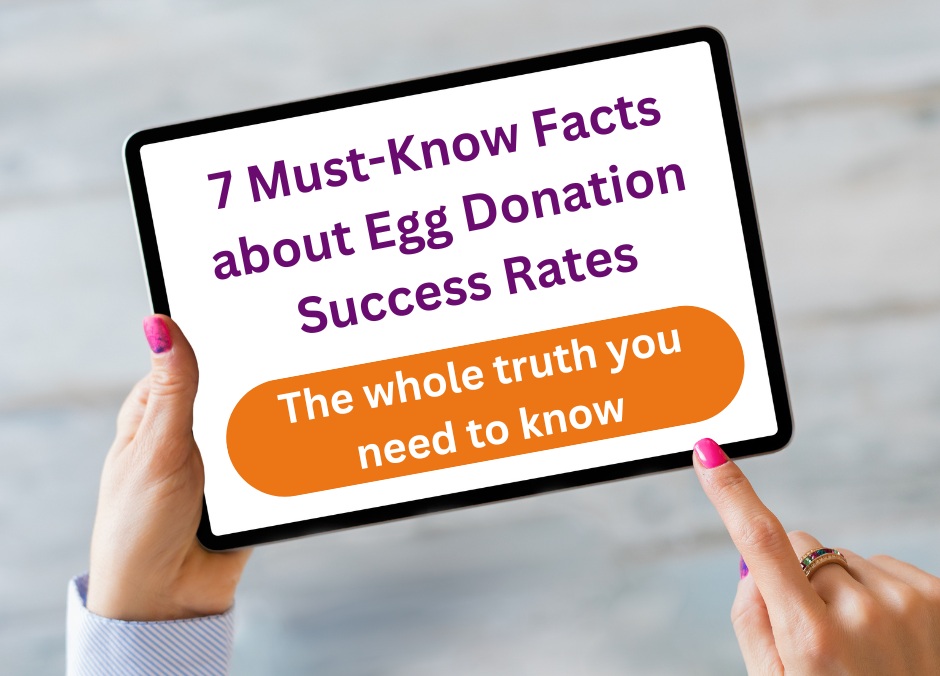

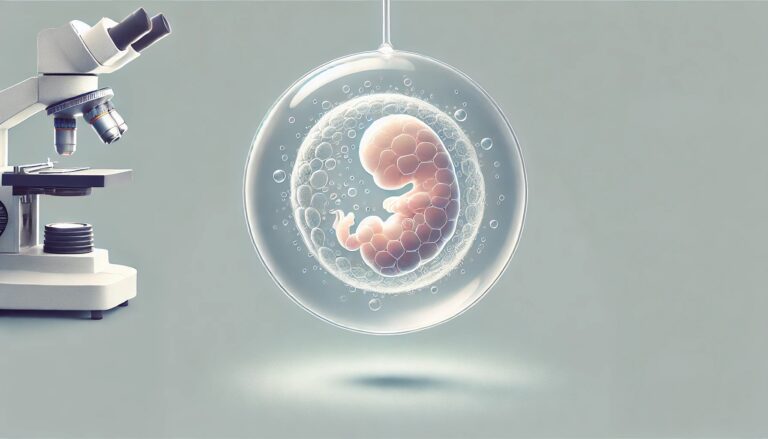

Hey, thanks for that. Didn’t know that before. I gonna have ivf in Cyprus so that will come really handy!!! Tnx!
I think attitude is the key and of course clinic with high success rates.
Yes, attitude helps as well. Stay positive! We’re with you. :)
So is there any difference between frozen donor eggs success rates and fresh ones?
I’m 41. I thought age of egg donor and success rate are somehow linked. For me it’s important the donor is young and healthy.
Where else can I find more info on ivf with donor eggs forums? articles?
Kendra, check our NEWS section https://www.eggdonationfriends.com/egg-donation-news/
even I would like to know the difference between frozen eggs and fresh eggs. Does that affect fertility? which one is better??
Dear Maria, a fresh donor egg cycle is when the patients is working with a selected donor of their choice. In this case, you get all the eggs from her cycle. If the doctors retrieve 25 eggs from the donor, you can use all those eggs now or later on. If in the cycle they get only 8-10 eggs, this is what you get to work with.
A frozen egg treatment cycle is when you or the clinic get a lot of eggs from an egg bank. The eggs are then fertilised. You usually get a batch of 6 eggs no matter how many were retrieved. If there were 26 oocytes collected, these eggs will be distributed to different recipients. Out of these 6 eggs you get only 4 might get fertilised, as you can see the numbers are low. This is just an example but can show you how it works.
The decision is entirely up to you. You should take all factors into consideration.
It’s great article – an maybe not all clinics would find it useful (and would be happy….on that) as it shows some markteting techniques used to hide inconvenient information…. for patients…
Anyway as far as ivf success rates are concerned there should be cumulative rates subject covered as it seems to be more often used by clinics. Well it’s understable – the higher is better… As I saw 93% ivf egg donation success rate on one of the websites….. it turned out it was cumulative ivf success rate – counting patients who undertook 3 ivf cycles in a row – so that’s cumulative rate…..
Thank you, Susan, for your comment. Actually we are working on an article covering cumulative success rates in IVF with donor eggs treatment. It will be published soon. Follow us on Facebook to get the updates about our new articles.
Definitely good point about cumulative ivf egg donation success rates. The subject is weird adn difficult to understand as some clinics show the cumulative rates only….
Why use cumulative ivf success rates? Does it matter for ivf with donor eggs as egg donation treatment is independent of woman’s age…?
I’m 36 and I suffer frm premature menopause. Will using donr eggs help me?
Dear Sushmita, if you suffer from premature menopause, egg donation treatment might be for you. After running tests, your fertility doctor will be able to choose the right course of treatment. If you wish to find the best clinic for you, contact us at [email protected] and we will help find an IVF clinic that is best for you.
To find the most reputable clinic, Dr. Levine says women should do some research to find out who does the best IVF treatments. Levine recommends going to the CDC s published fertility rate reports, calling up the best clinics, and telling them you d like to become a donor. Regardless of if you want to donate your eggs through a clinic or an agency, you can still call up clinics and see which agencies they work with. Purcell also recommends asking the clinic about possible risks and what are those risks at that particular clinic. We could give overarching risks but then what are the risks at your fertility clinic: How many cases of infection, or bleeding, or OHSS do you see in a year? Dr. Devine says that one of the first questions any potential egg donor should ask going into a clinic is if that clinic adheres to ASRM guidelines, since they re there for a reason.
Thurstan, Farnborough: My wife and I are going through our second round of IVF after the first one didn t work. We got through to the very end successfully, but the final result did not happen. We have to pay for our treatment, yet if we lived five miles in a different direction we would have got it free. We are told the success rate – for us its 25% to 30% – and you do live on hope. It is absolutely crushing to find out it has not worked and nobody can tell you why. Another ВЈ6,000 down the drain and you are left with a devastated feeling.